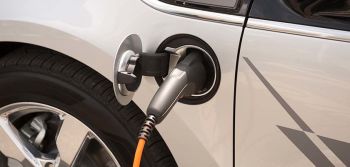Mythbusting: The Truth about EV Charging Solutions
- May 24, 2022
- Best Practices
- Electrical

Are electric vehicles (EV) here to stay? Or are they just a fad? In a world with information-overload, how do you figure out what information is true? Should you invest in the EV world? If so, why? To help you out, let’s debunk five common myths about EV charging.
Myth #1: EV adoption will not happen soon enough to invest now.
Today, electric vehicles do not make up a large share of the market in the United States (just below 5% of the market in Q4 2021). However, in countries similar to the United States (based on Gross Domestic Product (GDP) per capita), the shift to EV is speeding up. If EV charging in the United States grows at a similar pace as it has in those countries, we could see electric vehicles move from 5% to between 30% and 70% of the market in the next five years. With demand for EV charging likely to grow rapidly, it is best to invest now and have EV equipment in place when people need it.
Myth #2: EV is a fad. Nobody is committed to making this change.
Almost all car manufacturers have made a vow to be strictly EV manufacturers by a certain year, and those target dates are not as far in the future as you might think. For example, Bentley will have no combustion engines by 2030. General Motors plans to stop selling gas and diesel vehicles by 2035. Volkswagen hopes to have more than 50% full-electric vehicle sales by 2030, and 2026 will be the last year it launches a combustion platform.
Myth #3: Gas stations will all become EV charging stations.
While gas stations will be one target for EV charging stations, most chargers will be installed by businesses, restaurants, hospitals, and grocery stores. Companies offering EV charging to employees or customers is a value-added benefit.
For companies looking to add this perk, there are two main levels of chargers. Level three, or DC fast charging, can fully charge a vehicle in 30 minutes but are also expensive. Level two chargers are more accessible and affordable and can charge a vehicle in a few hours. The EV charging equipment gives you control over who can locate the charging station, who can use it and how they use it and can be managed by the user or by the manufacturer.
Myth #4: Long distance road trips will not be possible.
Where can you find an EV charging station when driving across rural parts of the country? Just ask your vehicle. Electric vehicles and EV charging stations are all connected to the cloud, so you can locate the nearest charging station from your vehicle. The interstate is a target for EV charging infrastructure, which should help long distance travelers. Because many models of electric vehicles can go more than 300 miles per charge, you will not have to stop more often on your trip, but you might have to stop slightly longer. Instead of filling up with gas and grabbing a snack in 10 minutes, you might have to wait 30 minutes to an hour. It is not as fast as pumping gas, but it still allows you to go cross country with your electric vehicle
Myth #5: Using electricity to charge vehicles is no cleaner than running on gas
While electric vehicles do have a carbon footprint from running on electricity, the lack of emissions makes electric vehicles cleaner for the environment. Right now, transportation is the number one source of greenhouse gas emissions in the U.S. (29%). In addition, batteries are more energy efficient than combustion engines. An EV electric drive system is only responsible for a 15% to 20% energy loss compared to 64% to 75% for a gasoline engine. Because they are more efficient, the cost per mile of operating an EV is roughly a quarter of the cost for a combustion engine. Together with emerging clean energy solutions like solar, wind, nuclear and hydro power, electric vehicles can greatly lessen the carbon footprint of our country.
Electric vehicles are not just a fad. They will be here sooner than you think. To get ahead of the game, now is a good time to invest. To better understand EV charging and see if it is right for you, contact us with questions.

ARTICLE BY:
SEAN MALLETTE
EMPLOYEE-OWNER, ENERGY SPECIALIST